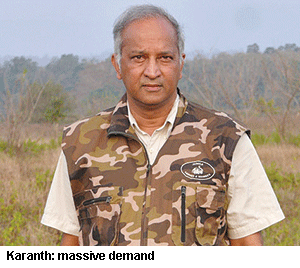Given that forests cover 20 percent of the landscape in India, there is no dearth of opportunities for committed youth interested in careers in wildlife conservation - GEETHA RAO
 With rising global awareness about the importance of maintaining essential ecological balance, life-support systems and preserving and protecting genetic diversity (flora and fauna), wildlife conservation has emerged as a highly-specialised vocation popularised by the legendary Dr. George Schaller, Steve Irwin and Gerald Durrell among others.
With rising global awareness about the importance of maintaining essential ecological balance, life-support systems and preserving and protecting genetic diversity (flora and fauna), wildlife conservation has emerged as a highly-specialised vocation popularised by the legendary Dr. George Schaller, Steve Irwin and Gerald Durrell among others.
National government agencies and NGOs dedicated to environmental research and conservation such as the Switzerland-based World Wide Fund for Nature (WWF, estb.1961) are increasingly engaging the services of biologists and conservation scientists to formulate and implement policies designed to protect wildlife and forest habitats.
Whether they are outdoors conducting a census of mountain goats, testing water samples for industrial pollution or following the migration trails of grazing herds, wildlife conservationists compile and analyse data which often forms the basis for future expeditions and even influences political agendas. They spend substantial time in research laboratories as well as in the field, building species inventories, experimenting with conservation genetics, testing, monitoring and preserving specimens, and mapping the migratory movements of wildlife.
Given that forests cover 20 percent of the landscape in India, which hosts the world’s second largest human population (1.3 billion) and also the largest tiger (3,891) and elephant populations (27,312), there is no dearth of opportunities for committed youth interested in careers in wildlife conservation.
Study programmes
Graduates with bachelor’s degrees in botany/agriculture/forestry/veterinary science/environmental science are eligible to apply for postgraduate degree programmes in wildlife science offered by the Wildlife Institute of India, Dehradun. The University of Pondicherry and the Bangalore-based National Centre for Biological Sciences (in collaboration with the Wildlife Conservation Society) also offer postgrad study programmes in wildlife science to graduates of sociology, economics, law, statistics, etc.
Among the reputed foreign universities offering year-long postgrad study programmes in wildlife ecology and nature conservation are the University of Kent and Sheffield (UK), Czech University of Life Sciences and University of Stockholm (Sweden) among others.
Pay and progression
In academia, a research assistant with a Masters in wildlife science or a Ph D student (junior research fellow) can expect to take home Rs.25,000-30,000 per month, while a post-doctoral fellow is likely to earn Rs.60,000-80,000. On the other hand, conservation companies and government forestry departments offer start-up pay packages of Rs.60,000-90,000 per month.
Wildlife conservationists can also work in education, research and development, zoos, the tourism industry, wildlife sanctuaries, environment NGOs and the Central government’s Indian Forest Service and state forestry departments.
Professional Profile
“Many young people are attracted to careers in wildlife conservation as it offers not just the chance to explore the wilderness and save wildlife, but also because it helps you develop critical thinking, problem-solving and communication skills. Given the 400,000 sq. km of forests covering the Indian landmass with a mere 80,000-90,000 managing them, there is a massive demand for professionally trained conservationists and scientists in India,” says Dr. Ullas K. Karanth, an alumnus of NIT-Surathkal and Florida University, who is currently director of the Bangalore-based Wildlife Conservation Society (India).
Hugely inspired by essays written by Dr. George Schaller, a German-born American mammologist who was doing pioneering work on tigers in Central India at the time, and books authored by Dr. Salim Ali, renowned ornithologist, Karanth became attracted to wildlife conservation while in engineering school. But given the limited study options available at the time, he took to farming in Mangalore after completing his engineering degree. Later in 1987, he enrolled in a Masters programme in wildlife ecology at the University of Florida, USA, and was subsequently awarded a doctorate by the University of Mangalore in 1993. In 1988, his dream of working with Dr. Schaller at the Wildlife Conservation Society (estb.1895) was finally realised.
“The working hours are long and unpredictable. But for people who are physically tough and love the outdoors and have an affinity for science-based analytical field work, walking in mud or slush, and being bitten by insects are minor disadvantages. Nothing can ever match the satisfaction of being one with nature,” says Karanth.